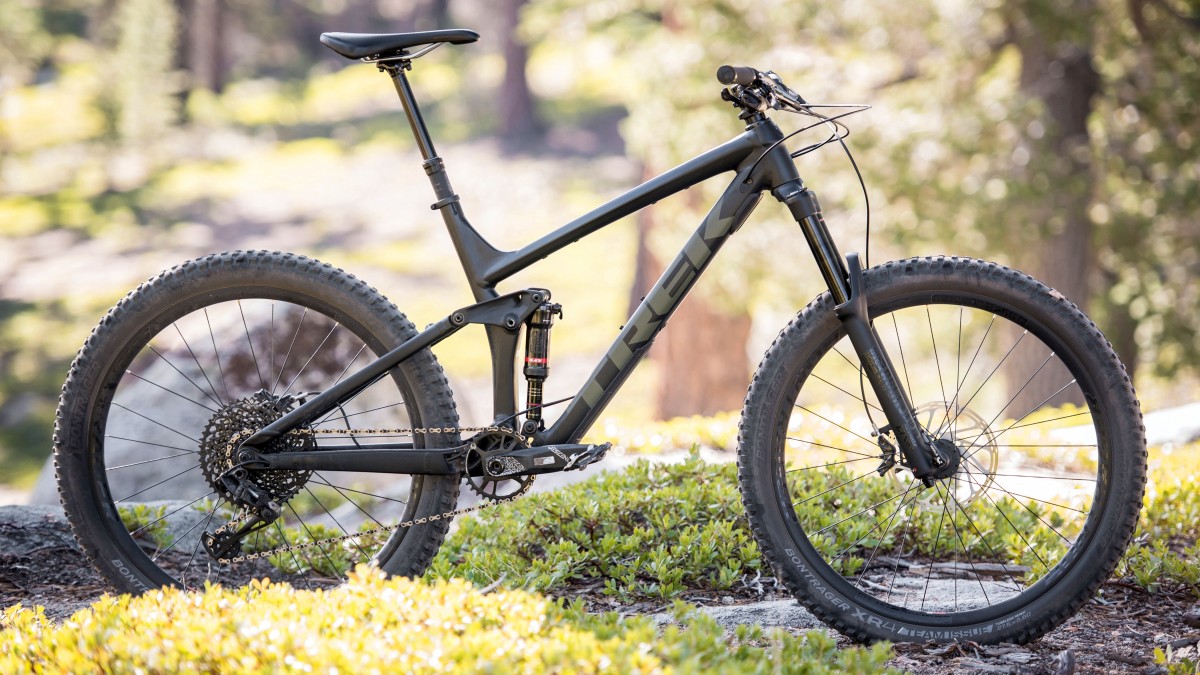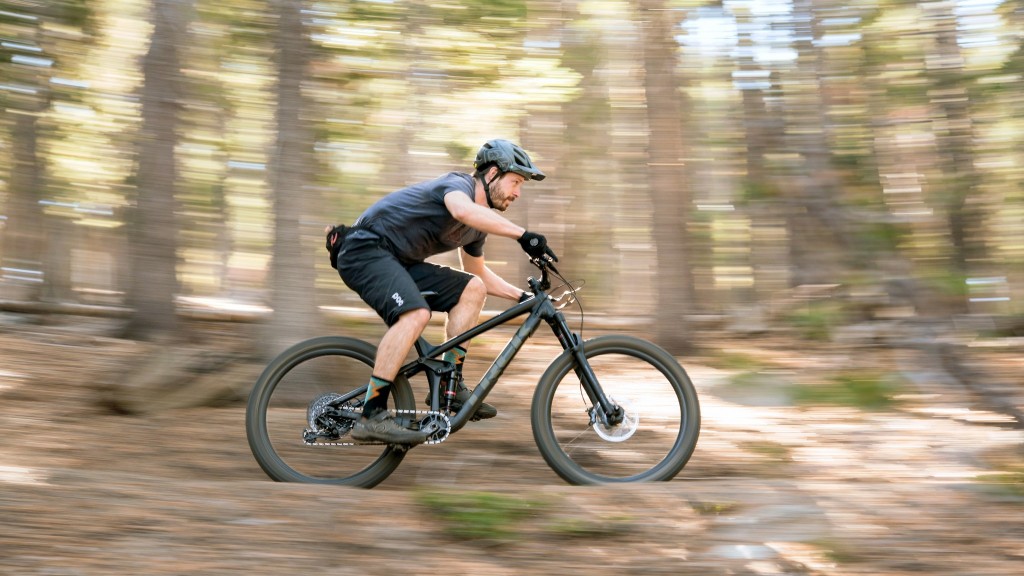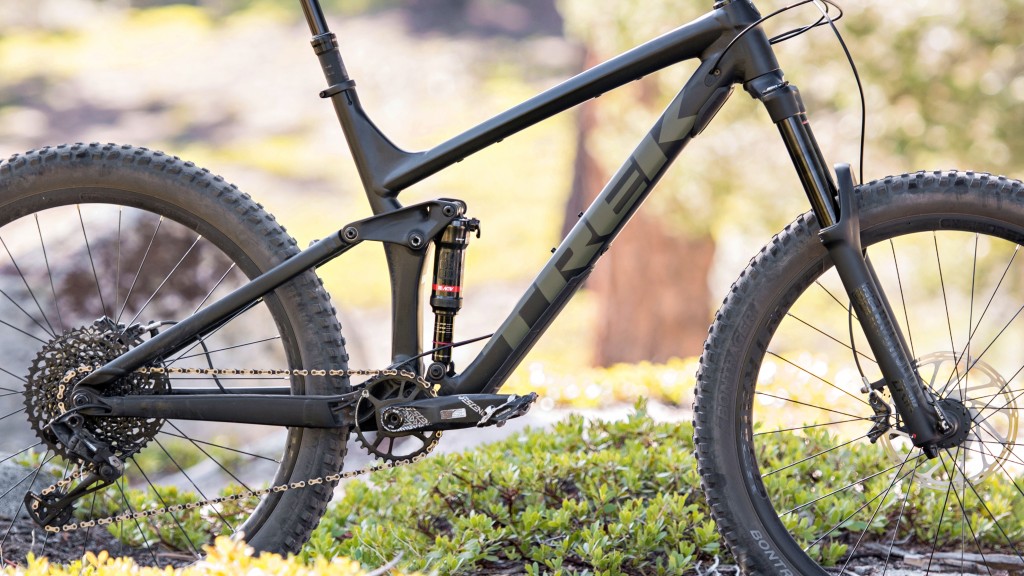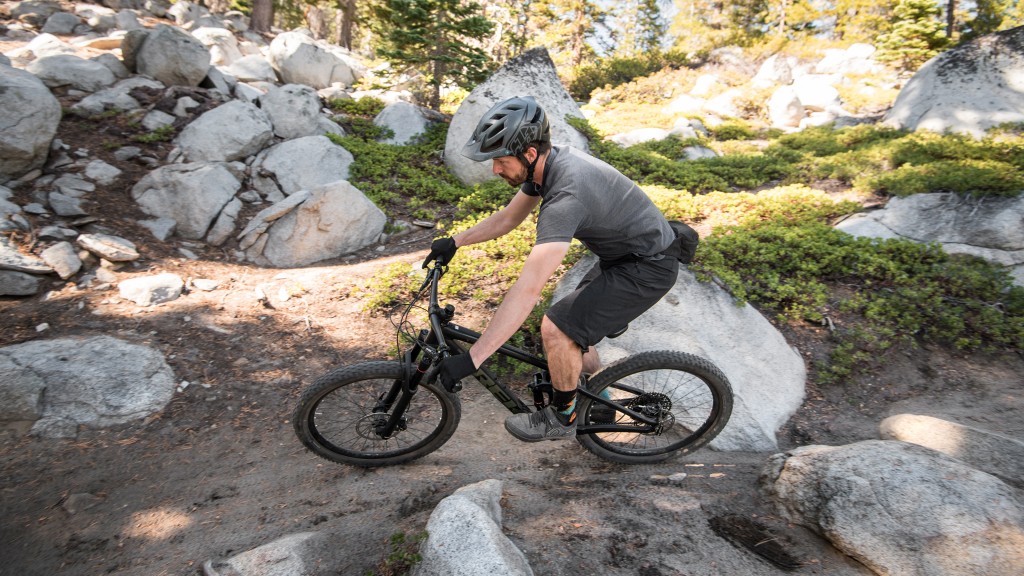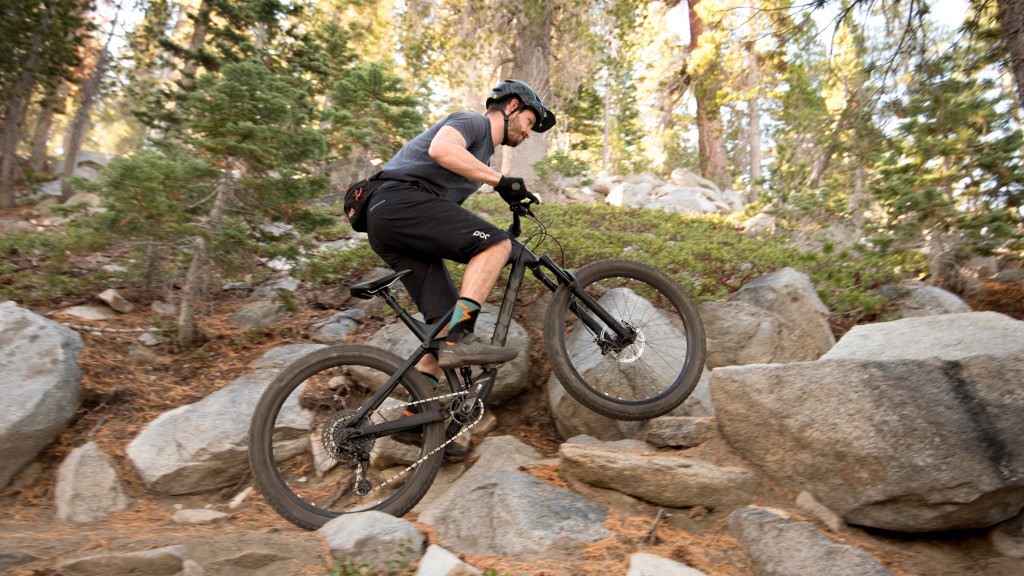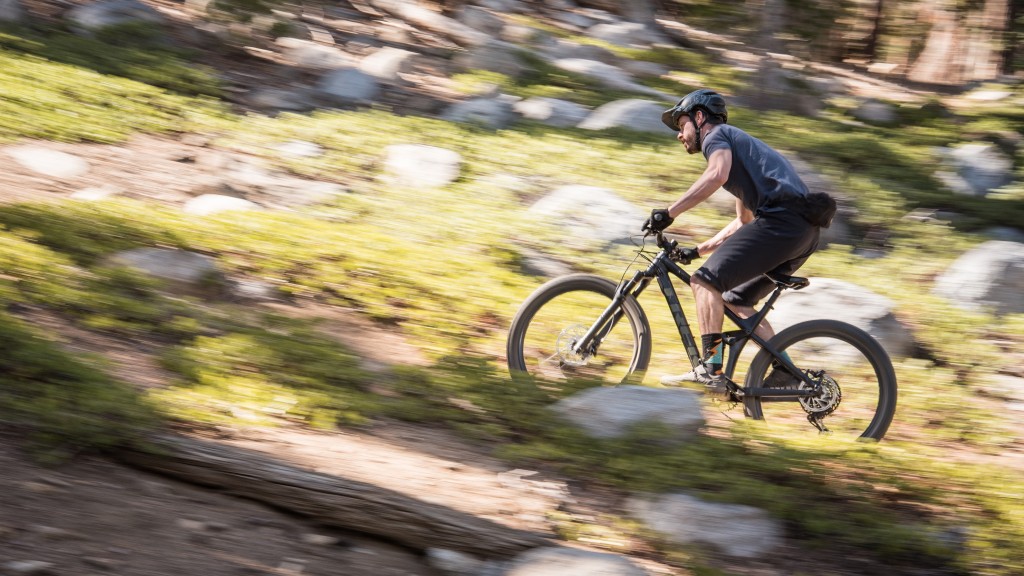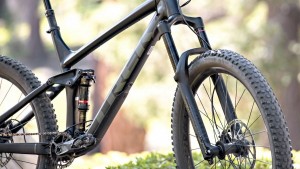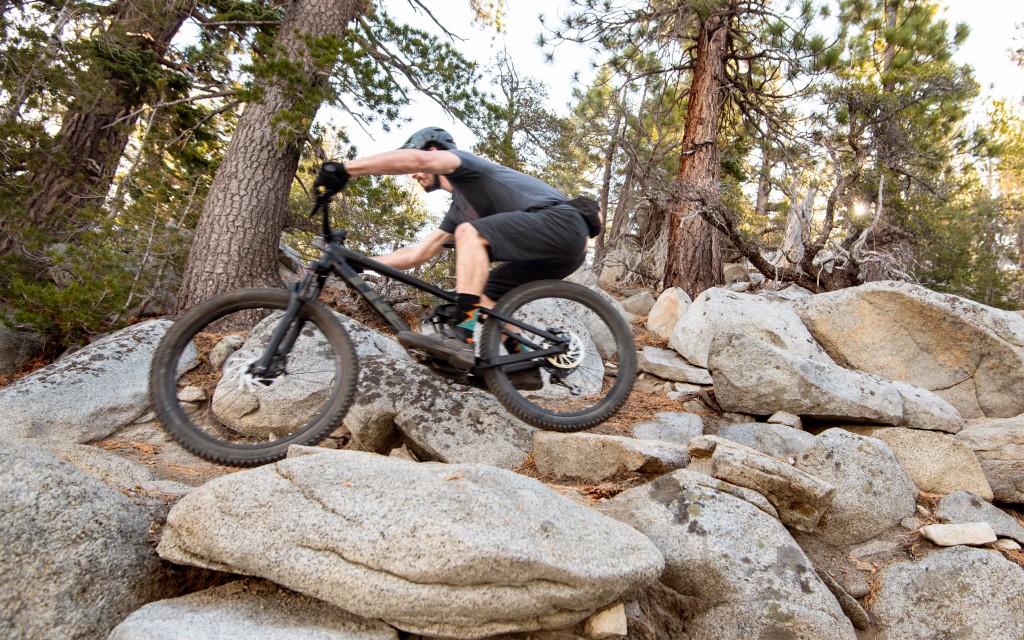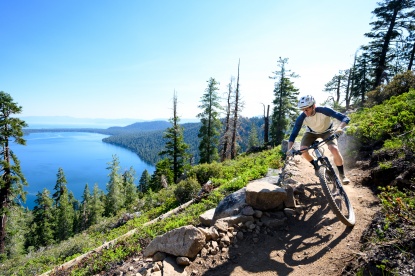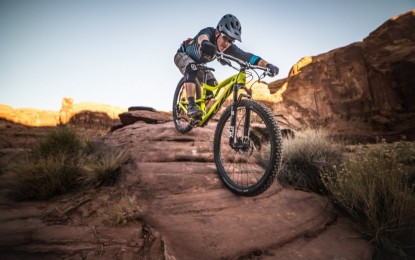Trek Remedy 8 Review
Our Verdict
Compare to Similar Products
 This Product
Trek Remedy 8 | |||||
|---|---|---|---|---|---|
| Awards | Best Consumer-Direct Bike | ||||
| Price | $3,999 List | $4,300 List $2,800 at Evo | $4,599 List | $2,999 List | $3,199 List |
Overall Score  |
|||||
| Star Rating | |||||
| Bottom Line | A well-rounded trail bike that handles well but lacks personality | An innovative, highly adjustable longer travel trail bike that can span disciplines from everyday trail riding to bike park laps | An excellent value mid-travel trail bike with a crowd-pleasing, well-rounded performance | The aluminum framed Ibis Ripmo AF is the best aggressive trail bike you'll find at this price | Ibis' versatile and fun-loving short travel trail bike in a more affordable but slightly heavier aluminum-framed package |
| Rating Categories | Trek Remedy 8 | Specialized Stumpju... | Fezzari Delano Peak... | Ibis Ripmo AF NX Eagle | Ibis Ripley AF Deore |
| Fun Factor (25%) | |||||
| Downhill Performance (35%) | |||||
| Climbing Performance (35%) | |||||
| Ease of Maintenance (5%) | |||||
| Specs | Trek Remedy 8 | Specialized Stumpju... | Fezzari Delano Peak... | Ibis Ripmo AF NX Eagle | Ibis Ripley AF Deore |
| Wheel size | 27.5" | 29" | 29" | 29" | 29" |
| Suspension & Travel | Active Braking Pivot (ABP) - 150mm | FSR - 150mm | TetraLink - 135mm | DW-Link - 147mm | DW-Link - 120mm |
| Measured Weight (w/o pedals) | 32 lbs 5 oz (Large) | 31 lbs 14 oz (S4) | 30 lbs 5 oz (Large) | 34 lbs (Large) | 33 lbs 3 oz (Large) |
| Fork | RockShox Lyrik RC 160mm | Fox 36 Rhythm - 160mm | Fox 36 Performance Elite, 150mm | DVO Diamond D1 160mm | Fox 34 Performance - 130mm |
| Shock | RockShox Deluxe | Fox Float DPX2 Performance | Fox Float DPX2 Performance Elite | DVO Topaz T3 Air | Fox Float DPS Performane EVOL |
| Frame Material | Aluminum | FACT 11m Carbon Fiber | CleanCast Carbon Fiber | Aluminum | Aluminum |
| Frame Size | 19.5" | S4 (Large equivalent) | Large | Large | Large |
| Frame Settings | N/A | Flip Chip and Headtube angle | Flip Chip | N/A | N/A |
| Available Sizes | 13.5", 15.5", 17.5", 18.5", 19.5", 21.5", 23" | S1-S6 | S-XL | S-XL | S-XL |
| Wheelset | Bontrager Line Comp 30, 30mm ID w/ Bontrager Hubs | Roval 29 alloy rims with Shimano Centerlock hubs, 30mm ID | Stan's Flow S1 rims with Stan's Neo hubs | Ibis S35 Aluminum rims with Ibis hubs, 35mm ID | Ibis S35 Aluminum rims with Ibis hubs, 35mm ID |
| Front Tire | Bontrager XR4 27.5 x 2.6" | Specialized Butcher GRID TRAIL T9, 2.6" | Maxxis Minion DHF EXO 29 x 2.5" | Maxxis Assegai EXO+ 2.5" | Schwalbe Hans Dampf 2.6" |
| Rear Tire | Bontrager XR4 27.5 x 2.6" | Specialized Eliminator GRID TRAIL T7, 2.3" | Maxxis Aggressor EXO 29 x 2.5" | Maxxis Assegai EXO+ 2.5" | Schwalbe Hans Dampf 2.6" |
| Shifters | SRAM GX Eagle | Shimano SLX 12-speed | Shimano SLX | SRAM NX Eagle | Shimano Deore 12-speed |
| Rear Derailleur | SRAM GX Eagle 12-Speed | Shimano SLX 12-speed | Shimano XT 12-speed | SRAM NX Eagle | Shimano Deore 12-speed |
| Crankset | Truvativ Descendant 6K 30t | SRAM Descendant 7K 32T | Shimano XT M8100 32T | SRAM NX Eagle DUB 32T | Shimano Deore M6100 30T |
| Saddle | Bontrager Arvada | Specialized Bridge Comp | Ergon SM Stealth | WTB Silverado Pro | WTB Silverado 142mm |
| Seatpost | Bontrager Line 150mm Travel | X-Fusion Manic 170mm (S4/S5), 34.9 diameter | X-Fusion Manic | KS Rage-i 150mm(Large) | KS Rage-i 150mm(Large) |
| Handlebar | Bontrager Line 780mm, 35.0mm Clamp | Specialized 6061 alloy, 30mm rise, 800mm width | Fezzari FRD Charger 35, 800mm | Ibis 780mm Alloy | Ibis 780mm Alloy |
| Stem | Bontrager Line w/ Knock Block | Specialized Alloy Trail stem, 35mm bore | Fezzari FRD Charger 35 | Ibis 31.8 50mm | Ibis 31.8mm 50mm |
| Brakes | SRAM Guide R | Shimano SLX 4-piston | Shimano XT 4-piston | SRAM Guide T 4 piston | Shimano Deore M6120 4-piston |
| Measured Effective Top Tube (mm) | 622 | 625 | 613 | 631 | 630 |
| Measured Reach (mm) | 457 | 475 | 480 | 473 | 475 |
| Measured Head Tube Angle | 66.1-degrees | 63-65.5 (adjustable) | 65.4-degrees H/65-degrees L | 64.9-degrees | 65.5-degrees |
| Measured Seat Tube Angle | 74.7-degrees | 76.9-degrees | 77.9-degrees H/77.5-degrees L | 76-degrees | 76-degrees |
| Measured Bottom Bracket Height (mm) | 355 | 340 H/333 L | 345 | 340 | 335 |
| Measured Wheelbase (mm) | 1203 | 1247 | 1234 | 1239 | 1217 |
| Measured Chain Stay Length (mm) | 433 | 438 (S1-S4) | 434 | 435 | 432 |
| Warranty | Lifetime | Lifetime | Lifetime | Seven Years | Seven Years |
Our Analysis and Test Results
Should I Buy This Bike?
The Trek Remedy is a nice choice for a lot of riders. Those who want a versatile bike but don't demand cutting-edge geometry or the lightest and fastest bike will like this rig. The Trek gets it done on all areas of the trail and comes with some pretty impressive components. The Remedy charges hard enough and climbs well enough for the majority of riders. What this bike lacks in top-end performance, it makes up for with its easy-going attitude and a wide range of terrain on which it is comfortable. This agreeable and reliable bike comes with excellent components and should work splendidly for casual and intermediate riders.
Frame Design
The Remedy has been a popular bike in the Trek lineup for some time. This balanced bicycle was introduced in 2006 with 26-inch wheels and has also run 27.5 and 29-inch wheels. This bike runs 150mm of rear-wheel travel and uses the Active Braking Pivot (ABP) Suspension design. ABP uses a pivot above the bottom bracket and a rocker link approximately halfway up the seat tube. There is a pivot located at the rear axle that is designed to reduce the influence of braking forces. ABP provides a very plush downhill ride with excellent bump compliance and a cloud-like feel. The major downside is that this suspension design relies heavily on the shock's climb switch on the ascent.
We rode a 19.5-inch (roughly a large) test bike. This bike has a 622mm top tube and a 457mm reach measurement. The chainstays are 433mm and the wheelbase is 1203mm. The head tube angle measures a moderate 66.1-degrees. Our test bike hit the scales at 33 lbs 4 ounces with tubes and without pedals.
It should be noted that while the 457mm reach measurement seems reasonable, this bike feels very short. Our 6'1" tester was extremely cramped. If you are in between sizes, we highly recommend sizing up on this bike.
Design Highlights
- Runs 27.5-inch wheels with clearance for tires up to 2.8-inch wide
- 150mm of rear-wheel travel
- Designed around 160mm fork
- Build kits starting at $3499.
- Available in carbon fiber or aluminum (tested)
- Available in 13.5", 15.5", 17.5", 19.5", 21.5", 23"
- Press Fit bottom bracket
- Uses Knock Block headset
- Lifetime frame warranty
Downhill Performance
The Remedy is a solid and predictable descender. The ABP suspension provides a supremely comfortable and plush ride. The conservative geometry is a curse and a blessing. On one hand, it handles well at slower speeds with a less aggressive pilot. On the other hand, when you're pinned, a longer and slacker design would add stability and confidence. The component grouping worked well although the Knock Block stem/headset proved to be problematic.
The long and low trend is in full swing in 2018. 65-degree head tube angles and 1230+mm wheelbases are commonplace on 150mm travel bikes. In addition, bottom bracket heights are creeping lower and lower. Many of these bikes are tremendously stable at high speeds and feel planted and grounded. The problem with these long and low bikes is that they often require aggressive riders and high speeds to come alive. Long wheelbases and slack angles can feel clunky in tight spaces or at slower speeds.
The Remedy doesn't buy into the long and low trend. This bike is designed with conservative geometry including a reasonable 1203mm wheelbase and 66.1-degree head tube angle. The result is a relatively nimble and easy-riding bicycle. The Remedy rides well at slow speeds. This bicycle works through tight spaces effectively and works through tight corners well (aside from Knock Block quirk outlined below). A lot of people can have fun riding this bicycle and that is a high compliment in our books. On the downside, the Trek can feel a little squirrely at very high speeds or charging through serious chunder. This is the scenario where slacker geometry and a slightly lower bottom bracket might enhance performance. Still, the middle-of-the-road geometry works well for the overwhelming majority of trails.
The ABP suspension delivers a plush and comfortable ride. The Remedy has a more linear feel compared to what we are used to. Progressive suspension is the opposite of linear and it tends to ramp up deeper in the stroke. Progressive designs provide more deep stroke support as they are harder to push deep into their travel. Linear designs are more plush with a smoother feel throughout the stroke. The Remedy has a supple and comfortable feel. The rather linear nature of this bike makes it possible to blow through the travel on occasion, but it does take a pretty substantial impact.
The Remedy steers well and responds well to rider input. The short wheelbase and upright geometry negotiate corners effectively and the 2.6-inch Bontrager XR4 tires are solid and can back up aggressive maneuvers. Make no mistake, at nearly 33.5-pounds, it does take the effort to lift this bicycle off the ground to pop over roots or rocks.
The Knock Block is a system in the headset and stem on some Trek mountain bike frames. Knock Block is a feature that prevents the handlebars from spinning around too far and damaging the frame in the event of a crash. With the use of Knock Block, Trek can design the downtube of their frames differently since they don't need to worry about the fork crown clearing the frame. The result, Trek claims, is a stiffer frame. The Knock Block can be problematic on tight and old school trails. If you are turning hard on legitimately tight corners, you may max out the steering and the Knock Block will not allow you to steer aggressively enough to make the corner. It should be made very clear that it takes a very sharp corner to experience this problem. If you ride purpose-built mountain bike trails or normal trails, this will be a non-issue.
The 160mm RockShox Lyrik RC is a stellar specification at the $3999 price tag. The Lyrik is stout, reliable, and smooth and worked flawlessly. The SRAM Guide R brakes are decisively fine and the Bontrager Line Comp 30 wheels were excellent. The 54-tooth hub engagement is quick and very beneficial for slipping in pedal strokes out of a corner. The Bontrager XR4 tires were surprisingly effective. They lack the aggressive shoulder knobs found on some of our favorite tires. That said, the XR4s hook up well and they have a smooth transition from the center knobs to the shoulder knobs.
Climbing Performance
The Remedy is a predictable climber that shines on technical climbs. This bike is definitely heavy and it is certainly noticeable on sustained climbs. The climbing position is comfortable but the tight top tube can be awkward. The component grouping worked well-enough on the ascent.
The Remedy sets you up in a nice climbing position. You are more or less on top of the bottom bracket. This helps transmit power efficiently and directly to the cranks. It is important to note that this bike benefits heavily from the use of the shock's climb switch, especially on smooth or semi-smooth trails. If you leave the RockShox Deluxe in the open position, there is substantial amounts of pedal bob. The middle shock position delivers the best balance of efficiency and traction.
If you encounter substantial amounts of root-laced or ultra rocky climbs, the Remedy is a great choice. With the shock in the open position, this bike delivers exceptional traction. Yes, the suspension is very active and bobs a bit, but the traction is stellar. Your rear wheel feels glued to the ground and it allows you to scoot right up a problematic section of trail.
The relatively short wheelbase on the Trek is beneficial in most situations. This bike bends through corners effectively. In addition, the more compact axle to axle measurement makes it easier to pull this bike up and over obstacles. Where longer bikes can get hung up more easily on a ledgy climb, the shorter Remedy scoots right up and over.
There is no way around the heft of this bicycle. It takes a lot of energy to take this bike on 3+ hour trail rides. This bike is especially exhausting if you're trying to climb with any sense of urgency. Here at OutdoorGearLab, we are far from weight-weenies, but once you break 32-pounds, it's a different story. We would be very interested to try the carbon fiber version. The Remedy 9.7 has a carbon frame with a relatively close build kit and sells for $4199. The 9.7 set up tubeless would weigh under 30-pounds. That is intriguing.
The build kit works well on the ascent. The SRAM GX Eagle works fine and it is nice to have that 50-tooth climbing gear. The Bontrager XR4 2.6-inch tires are solid on the climb. The wide footprint delivers a nice contact patch and the tread pattern rolls reasonably quick. There were tubes installed in our test bike. Setting this bike up tubeless would allow riders to run a lower tire pressure and would only add to the excellent climbing traction while also saving weight.
Photo Tour
Value
Our Remedy 8 sells for $3999. This model features a killer build kit including a RockShox Lyrik fork, SRAM GX Eagle drivetrain, a Bontrager dropper post, and SRAM Guide R brakes. Pair these stellar components with reliable on-trail performance and you have a strong value. This bike would be a particularly nice value for newer or less aggressive riders who don't need the latest and greatest. Advanced riders and hard chargers might find the somewhat outdated geometry to detract from top-end performance.
Conclusion
The Trek Remedy 8 is a prime example of an accessible trail bike. A huge group of riders can have fun on this rig and that is a high compliment. Downhill performance is decent and the ABP suspension is exceptionally plush and it feels like riding on a cloud. Climbing abilities are decent regardless of the lofty 33.5-pound weight. This bike carries a reasonable $3999 price tag and is outfitted with some impressive components.


